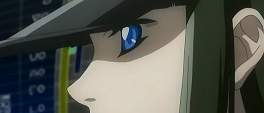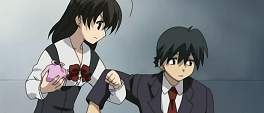



It would be easy to be confused as to just where exactly Blue Drop sits in terms of genre if one went by the first three episodes: perhaps the all-girl school histrionics would give some indication, but juxtaposed with operatic science fiction it would seem that maybe the series is trying to tell a different, as yet, hidden story touching on old Gundam favourites such as the horrors of war or its effect on children. Blue Drop actually occupies the secret third option and the hint lies in the source manga's genre: yuri.
The quiet, fringe-afflicted girl shows up in an entirely out-of-place outfit consisting of a leotard crossed with navy regalia
This divulgence is able to put a lot of the introductory material into context, and while it certainly doesn't contain anything near the raunchy material of the manga, Blue Drop still seems uncertain as to who the series is aimed at. The character design is less than stellar, it seems that clichés are born and bred in the school the central characters attend and the animation does nothing to compensate for this, instead the aesthetics feel washed out and less than enticing. Development is restricted to the protagonist only, and the revelation that her nemesis is captain of a futuristic underwater craft comes across as more underwhelming than it was perhaps meant to. So with the interpersonal relationships and sexual content that series should have inherited from its parent missing, and the other typical trappings of the yuri genre absent, the question of what exactly the series offers becomes difficult to answer.
Read the rest of this entry




Bamboo Blade seems, upon first glance, a very ambivalent series at least in its introductory episodes. It never seems to know whether to settle in as a light-hearted school drama with kendo or a straight-faced kendo drama with school fluff (or a kendo face school with light fluff drama). On the one hand is the irredeemable captain who's only current goal is to win a bet and subsequently obtain free food for a year, and on the other is a sadistic and despicable antagonist whose callous disregard for fair-play and sanity is cause for discomfort. The twenty six episode series could swing either way however if the series retains its indecisiveness, it may very well even out at wearisome.
it is hard to shake the feeling that this is simply a by-the-numbers seinen show that is willing to run its course
Bamboo Blade eschews common first episode clichés by maintaining a languid and predictable pace that carries over to the subsequent two. Favouring character development over ground-breaking story, the first episodes have yet to introduce all the members of the five girl kendo team; instead there are solid introductions to the eclectic group. The characters are neatly skewed from their apparent archetypes: the quiet introvert harbours a naive and childish sense of justice ordinarily championed by sentai characters; the supposedly prim and proper looker of the group is girlfriend to the most unlikely of boys and has a mean vigilante streak to her; while the enigmatic fourth member seems interminably insane. The most tiresome of characters, a blonde firecracker, is thankfully the one also given the least attention while instead the cookie-cutter teacher (whose likeness to Yuuichi Tate from Mai-HiME is uncanny) is left to propel events along.
Read the rest of this entry




Bright, colourful and full of barely concealed nudity, Umisho is a raucous and energetic series built upon simple principles that are well executed. Far from being intelligent, thought-provoking or in-depth, each episode kicks meaningful story-telling and character development to the curb and manages to be a thirteen episode onsen and beach scenario combined.
Umisho never belittles the audience by repeatedly hammering at the most obvious of plot points
Beginning with the only iota of character justification in the entirety of the show, Kaname Okimura joined the school swimming club to learn how to swim after a run-in with a supposed mermaid and nearly drowning in his earlier years. With that pesky plot out of the way, the series gets down to basics and has young women losing their clothing at every available opportunity. Ostensibly the series follows the swimming team of Prefectoral Umineko Shougyou High as they compete and subsequently win local and regional tournaments; however this is mostly superfluous to the aforementioned nudity. Not one to be entirely sexist, the swim team captain is a bronzed, muscled specimen of a man who strips off with more frequency than the women although this stems from his naturist tendencies rather than the women who are ordinarily victims of circumstance.
Read the rest of this entry




Rental Magica is another series which attempts to be the right-side of the "magic + school children =" equation. Whether the glut of recent shows with this theme is some kind of fallout from the Harry Potter fangasm or perhaps just some kind of coincidence is a question for the future; what is clear is that Rental Magica is a step ahead of its peers by not only being meticulously researched but, more importantly, remarkably engaging and fun.
Rental Magica works so well because it manages to blend a number of historical and mythological concepts into a coherent whole
Beginning with a frantic and kinetic opening sequence on a strangely deserted highway, the series follows a tried-and-tested template of a chaotic first episode, followed by a sedate second and finally settling into a more balanced third. The first is replete with foreshadowing and scattered dialogue one expects from an introduction; it neatly sections out what are no doubt going to be the meat of the series in the form of monster quelling, client interaction and light-hearted school jocularity. None of these individual aspects merit undue focus and the test of the series will be in how well it balances the different facets. After such a riotous initiation, the series obliquely steps back in time in order to flesh out the cycloptic protagonist and his apparent memory loss and relation to the derisive witch of the show. It's an odd move, especially as it at first seems to serve only to reintroduce the tiresome "rich" wench whose saving grace is her UK origin. The third episode continues to explore the enigmatic characters in the central "Astral" team, a format likely to be repeated until a more coherent antagonist can be conjured up.
Read the rest of this entry




I'm sure like many others I was enthralled by the story that the final episode of School Days had been indefinitely postponed due to a supposedly violent ending and its likeness to a real-world killing. Not one to pass up on controversy, I queued up the series expecting it to be a fluffy, real-world version of Shuffle! or perhaps akin to Kimi ga Nozomu Eien; what I didn't expect was an unflinching, overly-dramatic portrayal of the depths of teenage decrepitude.
the series' H-game roots are only evident in the amount of sexual deviance present
The first episode of this petite twelve episode series is as mediocre and clichéd as I expected: introverted loner Makoto takes a liking to a girl he sees on the train, female best friend tries to help him get together with her while secretly having the warm-and-fuzzies for him herself. Rolling my eyes and switching off my sensibilities I began to place bets on the most promising axe-wielding female: perhaps the fun-size, silent one is actually a dark-horse in all of this. It took less than half the series to convince me that ending with violence is just one of the punches that School Days will deliver.
Read the rest of this entry



















